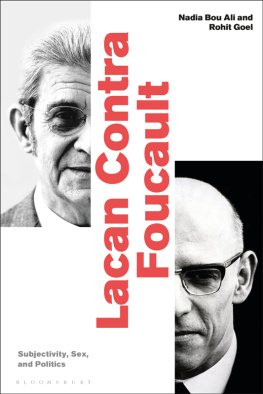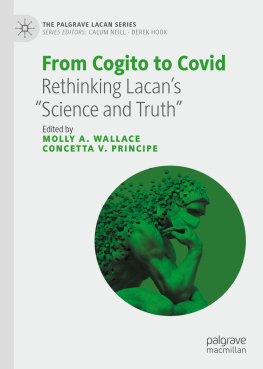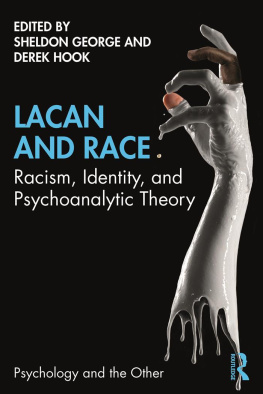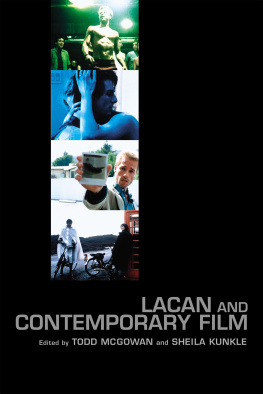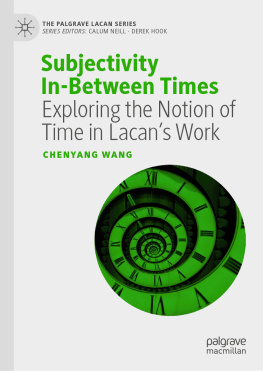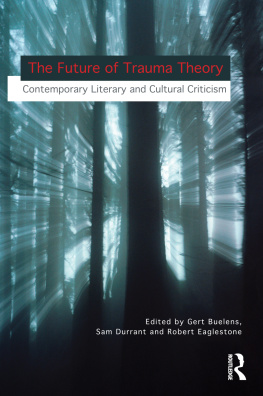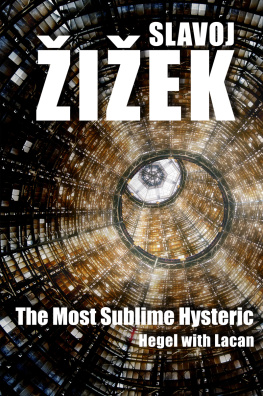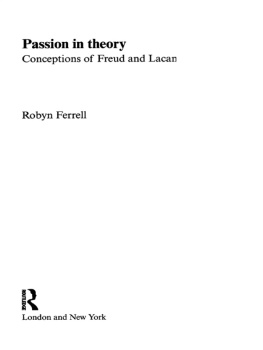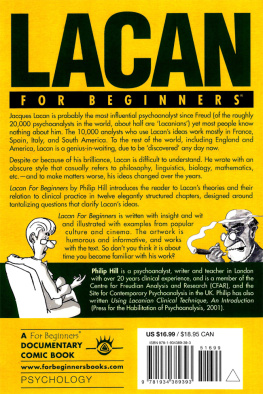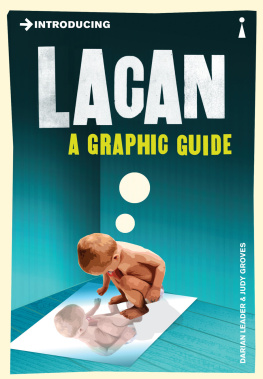Lacan Contra Foucault
Also available from Bloomsbury
Between Levinas and Lacan, Mari Ruti
Ricoeur and Lacan, Karl Simms
Foucaults Heidegger, Timothy Rayner
Foucault and Power, Marcelo Hoffman
iek and his Contemporaries, Jones Irwin
Lacanian Realism, Duane Rousselle
Desire in Ashes: Deconstruction, Psychoanalysis, Philosophy, edited by Simon Morgan Wortham and Chiara Alfano
Lacan Contra Foucault
Subjectivity, Sex and Politics
Edited by Nadia Bou Ali, American University of Beirut,
Lebanon, and Rohit Goel, Jnanapravaha, India

Anne van Leeuwen has a PhD from the New School for Social Research (2010). She is currently an Assistant Professor in Philosophy and Religion at James Madison University (Virginia). Her research is in twentieth-century French and German philosophy from critical theory to psychoanalysis to structuralism and post-structuralism, and she is particularly interested in the relationship between feminist theory and materialist politics within this tradition. In addition to various articles on this topic, she is working on a monograph on Simone de Beauvoir that situates her thought with the traditions of structuralism, psychoanalysis and Marxism. Anne teaches a range of courses at JMU, from twentieth-century French philosophy, critical theory, philosophy and film, to philosophy, art and literature, and she also runs the Philosophy & Film Club.
Joan Copjec is Professor of Modern Culture and Media at Brown University. Before moving to Brown she was for many years an editor of the art journal October and Director of the Center for Study of Psychoanalysis and Culture at the University at Buffalo, where she cofounded the journal, Umbr(a). She was also editor of the book series, S, at Verso Press. She is the editor of several books and author of Read My Desire, Imagine Theres No Woman and the forthcoming The First Picture Show: Kiarostami, Corbin, Lacan.
Lorenzo Chiesa is a philosopher who has published extensively on psychoanalytic theory, biopolitics and Marxism. His most recent books include The Not-Two: Logic and God in Lacan (MIT Press, 2016) and The Virtual Point of Freedom: Essays on Politics, Aesthetics, and Religion (Northwestern University Press, 2016). He is Visiting Professor at the European University at Saint Petersburg and teaches at the Freud Museum, London. Previously, he was Professor of Modern European Thought at the University of Kent, where he founded and directed the Centre for Critical Thought.
Mladen Dolar, born in 1951 in Maribor, Slovenia (former Yugoslavia), is Professor and Senior Research Fellow at the Department of Philosophy, University of Ljubljana. His principal areas of research are psychoanalysis, modern French philosophy, German idealism and philosophy of music. Apart from a dozen books in Slovene, his book publications include most notably A Voice and Nothing More (MIT 2006, translated into nine languages) and Operas Second Death (with Slavoj iek, Routledge 2001, translated into three languages). Two new English books are forthcoming with Duke UP and Verso. He regularly teaches at the European Graduate School in Switzerland and at the University of Chicago. He is one of the founding members of what has become known as the Ljubljana Lacanian School.
Samo Tomi obtained his PhD in philosophy at the University of Ljubljana, Slovenia, and is currently researcher at the Humboldt University of Berlin, Germany. His research areas comprise contemporary European philosophy, structuralism and post-structuralism, psychoanalysis and epistemology. He is the author of The Capitalist Unconscious: Marx and Lacan (Verso, 2015) and the forthcoming The Labour of Enjoyment (August Verlag, 2018).
Zdravko Kobe teaches Classical German Philosophy at the University of Ljubljana. He has published four books on Kants theoretical and practical philosophy and numerous articles, especially on Kant, Hegel and contemporary philosophy.
This volume was inspired by the conference Lacan Contra Foucault: Subjectivity, Universalism, Politics, held at the American University of Beirut, Lebanon, 24 December 2015. We would like to thank the co-organizers, Ira Allen and Ray Brassier, as well as all of the conference participants. The conference was sponsored by AUBs Centre for Arts and Humanities and supported by the Faculty of Arts and Sciences. We would like to thank Ahmad Dallal, Maher Jarrar and Patrick McGreevy for their help in making the conference possible.
Nadia Bou Ali
Given their profound and often polarizing influence on the humanities and social sciences, the paucity of sustained engagement with the (dis)connections between Foucault and Lacan strikes the eye. Lacan Contra Foucault was originally conceived as a staging of a civil war, an intimate enmity between two of the twentieth centurys most influential thinkers. The idea grew out of an eponymous conference held in Beirut, itself a site of protracted civil war that Lacan visited in 1974. Just four years later and a decade after he left Tunisia, Foucault travelled to Iran to witness the Islamic revolution.
Civil war and revolution Lacan and Foucault. In Beirut, Lacan met with students who were working in a context in which war has recurred since Lebanons inception, since class struggle has been disavowed only to return, with equal force, in the form of sectarian strife. Lacan was a subtle analyst of repetition, attentive not only to the phenomenons more obvious capacity to maintain order but also to its less apparent, transformative potential. He saw in repetition of traumas, historical events, symptoms and so on an unconscious plea to change the existing order of things.
By way of contrast, Foucault went to Iran in 1978 in search of something radically new, a conscious break from the past and present of Europe: the political spirituality of the mass revolution was an opportunity to reignite political imagination beyond what he took to be an anachronistic Marxism that was unable to contend with a new European regime of power. By the 1970s, when Foucault was delivering his late lectures on neoliberalism, he went to Iran looking for a new way to resist a force that no longer only governed with the sword of juridical repression, nor just through the disciplining of docile bodies, but more on a (neoliberal) basis of freedom that it therefore actively promoted. Thus, for Lacan, transforming the present order requires analytical attention to the return of the repressed, a focused listening to symptoms even if, upon first hear, they sound like a broken record.
Lacan and Foucault maintained different positions for thinking of politics, for Lacan, working-through and transformation; for Foucault, variously, anarchic violent resistance (his endorsement of the 1792 Paris massacres), increased visibility (his support of the Prisoner Information Group), silence (the Ars Erotica interlude in The Will to Knowledge), care of the self (his later efforts to develop a neoclassicist ethics of constructing the self). The difference between Lacan and Foucault was prefigured in their disparate evaluations of May 1968. Lacan did not waver in his critical analysis of the movement. Students indignant about what they felt as an incapacity of structural linguistics to ground meaningful political change battle cried that structures dont go down into the streets. Lacan couldnt help but see irony in the slogan, grafittied in classrooms and on city walls, an affirmation of precisely what the slogan claimed to negate. He warned the students that their actions heralded the bureaucratization of the university and saw May 68 as a symptom of capitalism, a site of struggle between capitalistic accumulation of knowledge and the irruption of truth linked to
Next page
